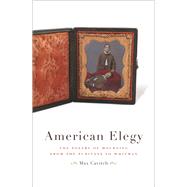
Note: Supplemental materials are not guaranteed with Rental or Used book purchases.
Purchase Benefits
What is included with this book?
| Acknowledgments | VII | ||
| Introduction: Leaving Poetry Behind | 1 | ||
| 1. Legacy and Revision in Eighteenth-Century Anglo-American Elegy | 33 | ||
| 2. Elegy and the Subject of National Mourning | 80 | ||
| 3. Taking Care of the Dead: Custodianship and Opposition in Antebellum Elegy | 108 | ||
| 4. Elegy's Child: Waldo Emerson and the Price of Generation | 143 | ||
| 5. Mourning of the Disprized: African Americans and Elegy from Wheatley to Lincoln | 180 | ||
| 6. Retrievements out of the Night: Whitman and the Future of Elegy | 233 | ||
| Afterword: Objects | 286 | ||
| Notes | 295 | ||
| Index | 335 |
The New copy of this book will include any supplemental materials advertised. Please check the title of the book to determine if it should include any access cards, study guides, lab manuals, CDs, etc.
The Used, Rental and eBook copies of this book are not guaranteed to include any supplemental materials. Typically, only the book itself is included. This is true even if the title states it includes any access cards, study guides, lab manuals, CDs, etc.